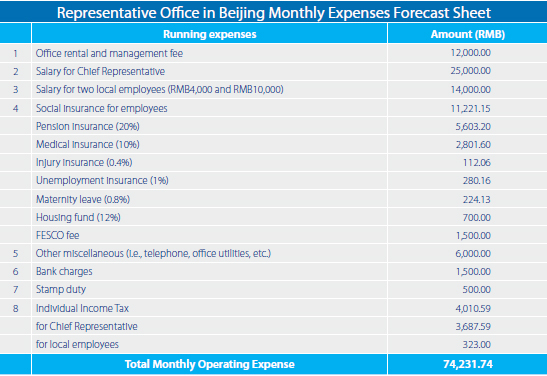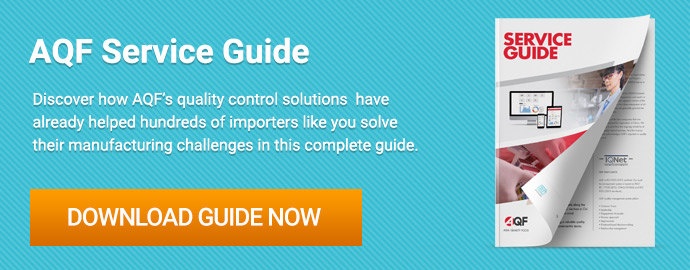 Opening an office in China and hiring your own product inspection staff there can be a massive undertaking. If you're considering it, chances are you probably aren’t a novice importer. You’ve been around the block a few times when it comes to manufacturing in China and the challenges associated with it.
Opening an office in China and hiring your own product inspection staff there can be a massive undertaking. If you're considering it, chances are you probably aren’t a novice importer. You’ve been around the block a few times when it comes to manufacturing in China and the challenges associated with it.
Full-time inspectors certainly have some key benefits (related: 4 Ways Importers Conduct Product Inspection [eBook]). Your inspectors will be your employees, managed under your own business values and rules. And you’ll have direct communication with the people actually inspecting your products, who you can train to be intimately familiar with your product designs and specifications.
But establishing your own office in China and hiring your own full-time inspectors opens the door to a whole host of new challenges you won’t have faced before.
Working with AQF to inspect your products on your behalf can be a more cost-effective, more reliable and easier quality control option for many importers, even for those with high production volumes. Let’s take a look at some of the key benefits of hiring AQF.
1. Avoid the legal challenges of hiring full-time inspectors in China
Before you can even think about hiring a full-time inspector in China, your business must first be able to legally operate in China. Most importers have two options: set up a representative office or a set up a wholly foreign owned enterprise (WFOE). A representative office is easier and quicker to set up than a WFOE, but it also has a few distinct disadvantages.
What are the steps for setting up a representative office in China?
Below is a brief, but not exhaustive, overview of the steps and prerequisites to open a representative office in China:
- Your company must have been in operation for two years prior to applying.

- You must have a valid office space lease prior to applying with at least one year remaining on the lease starting from the application submission date.
- Obtain company name approval for the Chinese market. The name must be structured to include: country, corporation name, city and "representative office".
- Apply and register with the local Administration for Market Regulation (AMR), including submitting a notarized copy of your parent company’s incorporation certificate and credit letter.
- Register with the local Public Security Bureau (PSB) and obtain a “chop”. A chop, or an official seal bearing the company’s Chinese name, is necessary to validate documents and contracts.
- Register with related administrative offices, including local Technical Supervision Bureau (TSB), Administration of Foreign Exchange, Tax Bureau and Customs Bureau.
- Apply for work and resident permits for foreign employees and apply to hire local (Chinese) employees through government-authorized employment agencies.
What can a representative office in China legally do?
Representative offices are not considered independent business entities. Instead, they can only act on behalf of, or as a liaison for, your foreign-based parent company.
The good news is that quality control and sourcing falls under this umbrella as a service provision to the parent company. But a representative office cannot engage in “direct business activities” or earn profits and is limited to employing four foreign nationals at a time.
Opening a representative office also doesn’t eliminate the need for third-party intermediaries. To directly hire Chinese nationals, including full-time quality control inspectors, a representative office must work though an authorized human resources agency, known as a foreign enterprise service company (FESCO). The agency acts as a third party, signing a contract with the representative office on one side and the Chinese employee on the other.
Chinese human resource agencies, usually state-owned and approved, charge a fee and can only offer your inspectors standard, non-negotiable, fixed-term employment contracts lasting at least two years. And if the FESCO is both recruiting and managing payroll, conflicts of interest and misuse of confidential information can easily occur.
What’s difficult about setting up a wholly foreign owned enterprise (WFOE) in China?
A wholly foreign owned enterprise might make more sense for businesses committed to developing a local Chinese presence and eliminating reliance on third parties.
Setting up a WFOE will require you to follow all of the same steps for a representative office, as well as some additional ones, including:
- Obtain approval from the Ministry of Commerce (MOFCOM) either by traditional application or the Ministry’s simplified record-filing process.
- Register and apply for a business license at the local AIC. The AIC has recently simplified this process significantly by issuing a “five-in-one” license covering social security registration, statistical registration, business license, organization code and tax registration.
- Draft employment contracts for foreign and local employees, which should be in Chinese and comply with local law. Failure to comply puts you at risk for paying penalties to employees and administrative fines.

- Create clear rules and regulations (规章制度 guīzhāng zhìdù) in Chinese that provide grounds for terminating employees.
China differs from countries with “at-will” employment or similar laws where you could legally fire anyone, practically whenever and for whatever reason you want. It’s often very difficult to terminate China employees during their term of employment without proven cause and severance payment. You must explicitly outline statutory grounds for termination, or your employee could come back and sue you for firing them without cause.
How you save time and avoid legal challenges by working with AQF
Local offices in China offer foreign businesses much more freedom in creating contracts and managing business operations. But the process for establishing a local office is not a quick or easy one.
Most legal experts estimate setting up a representative office or WFOE takes a few months, not including the time needed to hire and train your new inspectors. Establishing a legal entity in China also poses more legal risks to your brand if you make mistakes in the application process or in drafting employee agreements.
By working with AQF, you can schedule an inspection in as little as 24 hours. And you don’t need complex employment contracts or legal documents—just pre-payment for the first inspection.
2. Cut costs by paying as you go for inspections without annual salaries and overhead
Hiring a full-time inspector in China means you’ll need to pay for all of the expected, standard costs associated with full-time employees and year-round operating costs.
Below is an estimate of monthly running expenses for a representative office based in Beijing with one foreign chief representative and two local employees. Most factories, and possibly your representative office, will be located in more remote areas where costs are much lower. But this breakdown shows the kinds of expenses you’d likely face when running a local office.
This monthly estimate totals about $11,717 USD at current exchange rates, or about $140,600 USD yearly. Professional third-party inspection companies like AQF usually charge between $200 USD and $300 USD for one full day of an inspector’s time, often called a “man day”.
Using this estimate, you would need to use between 39 and 59 man days from a third-party inspection company each month to match the costs of running a representative office in Beijing. This assumes you have no seasonal variation in production. And remember, even if you don’t need inspections year-round or during off seasons, you’ll still have to pay salaries and these associated office costs.
How you save money on your QC inspectors’ travel costs with AQF
Salaries and office overhead aren’t the only costs you need to consider. Travel costs incurred when your inspector travels from their home to your supplier’s facility can also be significant. It’s common practice for employers to reimburse inspectors for these costs.
Not only does working with AQF eliminate the costs associated with running your own office, but AQF can also save you money on inspector travel costs. You’ll pay an all-inclusive rate for inspections in all major manufacturing areas in Mainland China. This means any travel costs incurred by inspectors are included in the standard man-day rate.
AQF also typically assigns an inspector from the nearest major city to perform inspection wherever you might need it. This helps keep your man-day rate rate low by minimizing travel costs.
Schedule product inspections from AQF when you need them
Circumstances can change suddenly and without prior notice when manufacturing in China.  These unforeseen changes can hinder inspection when you’re relaying on a limited team of full-time staff. For example, your inspector might need to stay longer than first planned at a factory to complete a service. And while you expected them to perform an urgent inspection at another location the next day, now that’s not possible.
These unforeseen changes can hinder inspection when you’re relaying on a limited team of full-time staff. For example, your inspector might need to stay longer than first planned at a factory to complete a service. And while you expected them to perform an urgent inspection at another location the next day, now that’s not possible.
AQF’s large network of inspectors protects you from unexpected delays and other problems that might otherwise prevent inspection.
And instead of being locked in to an annual contract, you can choose when to conduct inspection with AQF based on your current situation. There’s no minimum order volume or long-term commitment. You have the freedom to control when you need inspection and how often, without needing to pay full-time inspectors’ salaries even during downtime.
3. Limit product inspector integrity risks
One major reason importers choose to hire full-time inspectors is the consistency of having a single, dedicated employee routinely inspecting their products for each supplier. This can certainly increase transparency and streamline communication regarding the inspection process and results.
But an often overlooked risk of sending the same inspector to a supplier’s facility is that they might develop a close personal relationship with factory staff. Inspectors typically work alongside the same factory workers for several hours or days at a time. And it’s important to have a strong professional relationship with your supplier. But you don’t want your inspector’s judgement compromised because they’re best friends with factory staff.
 Seemingly innocuous actions, like attending dinner or karaoke with factory staff, can quickly lead to a conflict of interests when it comes to inspecting your products. In addition to engaging in leisure activities, factory staff might try to influence your inspector by offering them accommodation, transportation or even gifts or cash bribes (related: Top 5 Issues that Can Affect QC Auditor Integrity).
Seemingly innocuous actions, like attending dinner or karaoke with factory staff, can quickly lead to a conflict of interests when it comes to inspecting your products. In addition to engaging in leisure activities, factory staff might try to influence your inspector by offering them accommodation, transportation or even gifts or cash bribes (related: Top 5 Issues that Can Affect QC Auditor Integrity).
When your inspector then discovers quality issues within a PO, pressure from factory staff could persuade them to “turn a blind eye” to certain issues at the factory. A compromised inspector might:
- Falsely report inspection results, including the number and type of defects found, as well as on-site testing results
- Inspect a smaller sample size than agreed upon
- Overstate order status and the quantities of units at various production stages
Without clear ethics policies, your inspector might think you won’t notice or blame them for any of the above transgressions. And bear in mind that well-paid employees are more likely to value their jobs and are less susceptible to taking bribes or falsifying inspection results. Whereas paying your inspectors a low wage or salary can inspire corruption in the field.
Maintain your QC inspector’s objectivity through AQF’s clear integrity policies
Rotating inspectors from one order to the next is a common practice to limit the risk of inspectors developing relationships over time with factory staff. But if you don’t have the means and resources to hire several inspectors, you might be forced to repeatedly rely on few inspectors for all of your orders.
AQF typically has several inspectors based in each service area capable of inspecting your product. This large network of inspectors allows AQF to regularly rotate inspectors to prevent any one inspector from getting too close with factory staff (related: How AQF Prevents Corruption Issues from Hijacking Your Product QC).
Meanwhile, AQF prevents integrity issues internally through:
- Integrity-conscious hiring practices: AQF screens potential inspectors through open-ended, integrity-focused questions regarding potential bribery and scenarios involving conflicts of interests. AQF also offers competitive pay to inspectors to discourage corruption.
- Internal auditing in the field: Supervisors regularly shadow inspectors in the field, with no advance notice, to verify professionalism and interactions with factory staff.
- Documentation: Following each service, inspectors must submit a service declaration form signed by a factory representative and attesting to any gifts, meals, or other favors provided. In addition, all inspectors are trained on and agree to AQF’s clear Code of Ethics.
AQF takes responsibility and assumes liability for any integrity issues found with our inspectors. Our policies protect your interests. Even better, they save you from the managerial challenges of navigating and enforcing inspector integrity alone.
Conclusion
Hiring your own staff does have its benefits. But maintaining a local office in China with full-time inspection staff generally only makes sense if you have the time and budget to establish and support it and a stable and sufficient volume of inspections year-round.
There is no “one-size-fits-all” solution. In fact, some importers prefer to use both. You might hire full-time staff where inspections are consistent and hire third-party inspectors from AQF where you need inspection less often.
Regardless of what approach you take, remember to pay heed to inspector integrity risks. You stand to lose time, money and customers by failing to hold your inspectors accountable and take steps to prevent integrity issues.
How have you faced the challenges of hiring full-time inspection staff in China? Let us know in the comments section below!







